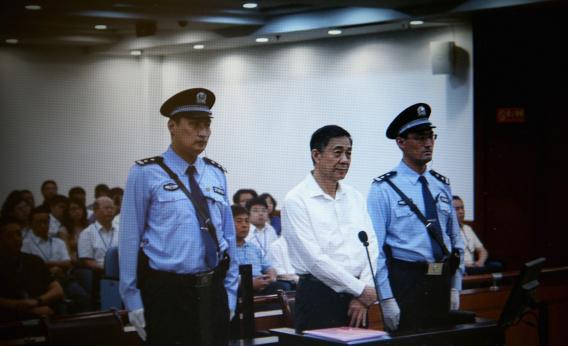Last month, much of China was transfixed by the trial of Bo Xilai, the fallen star of the Chinese Communist Party. Among the lurid details of crime and corruption, none elicited greater excitement than Bo’s revelation that his wife Gu Kailai (already convicted of the murder of a British businessman) and his “top cop” Wang Lijun (already convicted of treachery and treason) carried out a secret love affair.
The expressions Bo used to describe the romance between his wife and his chief of police challenged the translation skills of China’s journalists. Let me explain.
Bo told the court that the two lovebirds had an ànliàn (暗恋) and that they were rújiāosìqī (如胶似漆). Now, China’s official press organ, the Xinhua News Agency, frequently translates its stories into English for the benefit of Westerners (and to ensure that its spin is well-circulated). Xinhua employs a number of specialists in both British and American English to help do this, and they translated the first expression, ànliàn, as “was infatuated with” and the second, rújiāosìqī, as “were stuck together like white on rice.”
Netizens quickly took to their keyboards to criticize both translations, calling them clunky and not properly nuanced. Xinhua’s editors conceded in a blog post that “had a crush on” might be better for the first term, but stuck with “was infatuated with.” As for the second expression, the British English experts at the agency suggested that it might be better rendered as “they were together like honey and bee,” but the American English experts argued otherwise and “they were together like white on rice” won out. The editors gamely explained online that “white” here refers to “egg white” (!!), because when egg whites are poured on top of white rice, the whites will envelop each grain of rice and they will be difficult to separate. They added that “when used in a short phrase, ‘egg’ is generally elided.” Of course, none of that is true or has anything to do with the actual meaning of “like white on rice.”
Anyway, I don’t believe that “was infatuated with,” much less “together like white on rice,” was what Bo Xilai had in mind.
The expression ànliàn (暗恋) may be rendered as “unrequited love; clandestine love,” where 暗 signifies “concealed; hidden; covert; gloomy.” Infatuation and crush are far too tame and don’t at all emit the necessary dark undertones.
It is much more difficult to convey the essence of rújiāosìqī (如胶似漆). Literally, it may be translated word for word as “like glue; like paint/lacquer/varnish.” That would imply that Bo thought Gu and Wang were “tacky; gummy; viscid; treacly” with each other. Again, “like white on rice” is too tame, not to mention lame, and doesn’t adequately capture the sexual energy.
Taken together, I’d propose a much more pointed translation. According to Bo, his wife and his top security officer had an illicit affair and they couldn’t keep their hands off each other. Theirs was a forbidden love, wet and sticky as such passionate flings often are. Somewhat like rice.
A version of this post originally appeared on Language Log.
